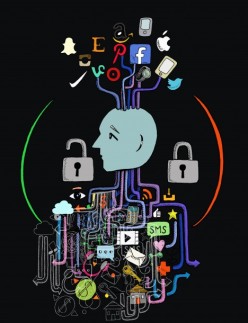
Illustration for Techonomy by Clara Kirkpatrick
How many times have you clicked on an app, went in search of that photo you took back then, or went to Spotify and thought “I hope it remembers me?” Hours later you may curse the invasion of your privacy at the hands of technology. But in that moment you want technology do what it does best, recall who you are and what you like.
I first realized how dependent I had become on my customized user experience when I had to do a system restore and YouTube forgot who I was. See YouTube Doesn’t Know Me Anymore. It had become time consuming and just plain annoying to reintroduce myself to my technology.
Target Ads
It was always a love hate relationship. When I did internet research for client blog articles and I was pestered for weeks with ads related to my search I was annoyed, and frankly creeped out. However, when these ads actually reflected my true desires it was a different story. Like my recent good fortune when Facebook recommended the group “Prague Hamburger Lovers.” I discovered an entire group devoted to the search for the best hamburgers in Prague. It was an active group, with very current information, and detailed descriptions of sumptuous beef burgers with “real” cheddar cheese (the Czech version tastes a bit rubbery to some Expats). I hadn’t searched for this gift – it was handed to me on a Facebook silver platter.
A new study conducted by Accenture found that the majority of consumers in both the U.S. and UK are willing to have trusted retailers use some of their personal data in order to present personalized and targeted products, services, recommendations and offers. While 86 percent of those surveyed said they were concerned that their data was being tracked, 85 percent said they realized that data tracking make it possible for retailers to present them with relevant and targeted content. Almost half (49 percent) acknowledged they were willing to allow trusted brands to track their data in return for relevant recommendations, targeted offers, and information on future product availability.
FACEBOOK Wants to Shape Me
It was by accident that my partner and I discovered that even when we had the same friends, we did not have the same Facebook feed from them. Facebook collects user reactions to fine tune its News Feed. There is enormous power in that Like button.
The News Feed has hooked users on Facebook. According to a Time article nearly a billion people around the world now look at Facebook daily. The company runs the second-most-popular website in the world and the most-used mobile app in the United States. American users spend nearly as much time on the site per day (39 minutes) as they do socializing with people face-to-face (43 minutes). That has turned Facebook into an online advertising behemoth ….
I even surrendered to Facebook just to avoid constant logins and passwords, and answered yes to any offer to logon with Facebook. Which is even more troubling given the fact that I listened to podcasts about Facebook’s social experiments and I still gave them a key to the door of my life.
Radio Lab on Facebook
https://www.wnyc.org/widgets/ondemand_player/radiolab/#file=%2Faudio%2Fxspf%2F430674%2F
See NPR’s “Lab Rats One And All That Unsettling Facebook Experiment” and All Tech Considered. At the time the Internet was overwhelmingly outraged. “Even the Editor of Facebook’s Mood Study Thought It Was Creepy,” Adrienne LaFrance wrote, at The Atlantic.
The Price of Connection
Many of our favorite apps ask for a series of permissions upon download that should scare us; Contacts, media files, location, photos and ability to share with Third Parties. They do have some legitimate reasons for asking. Why we say yes is another matter.
I confess that I like it when my phone remembers my last google search, especially if it is the restaurant I now search for in the windy, twisty Prague streets. I’m happy that Podcast Addict recommends things for me based on my obsession with Serial, Tim Ferris and Girlboss. I even appreciate Google Maps saving that place I got completely lost trying to find last time.
But, now we also have to contend with facial recognition software. The current U.S. TV hit, Person Unknown, is in no way science fiction – its science fact. Facebook has built it into its system and the future uses on a platform that is the third largest country on Earth are mind boggling. Not even the infamous National Security Administration (NSA) has that many faces on record.
Apple has come out as somewhat of a privacy champion. Apple kicked out over 200 apps that collected personal data in violation of the company’s privacy policies for its online store. The iPhone maker made the announcement a day after researchers discovered hundreds of apps using Chinese advertising software that extracts ‘personally identifiable user information.’ Not everyone considers that a smart move on Apple’s part.
Apple is going to realize very soon that it has made a grave mistake by positioning itself as a bastion of privacy against Google, the evil invader of everyone’s secrets. The truth is that collecting information about people allows you to make significantly better products, and the more information you collect, the better products you can build. Apple can barely sync iMessage across devices because it uses an encryption system that prevents it from being able to read the actual messages. Google knows where I am right now, where I need to be for my meeting in an hour, what the traffic is like, and whether I usually take public transportation, a taxi, or drive myself. Using that information, it can tell me exactly when to leave. This isn’t science fiction; it’s actually happening. And Apple’s hardline stance on privacy is going to leave it in Google’s dust.
 The Cat is Out of the Bag
The Cat is Out of the Bag
Although it may be too late to get the cat back in the bag, last month the European Union passed new comprehensive data protection laws –some of the most progressive and stringent in the world. In the United States, the FTC is taking on an increasingly active role of policing the data-driven activities of companies under Section 5 of the Federal Trade Commission Act prohibiting ‘‘unfair or deceptive acts or practices in or affecting commerce.’’ In China, a draft Network Security Law released over the summer notably included requirements for Chinese network operators to safeguard personal information and obtain consumer consent to use personal data. Read more at Technology.com.
According to a study from the University of Texas, we can attribute our preference for personalized experiences to two key factors: desire for control and information overload. However, consumers are increasingly aware that their data has significant value to companies who keep the vast share of the derived economic benefit to themselves. A Eurobarometer Study published in June 2015, revealed that 67 % of respondents are concerned about not having complete control over the information they provide online. Will there be an “Internet Spring,” or are we destined to remain under the spell of technology.
Honestly, the people who are concerned that all of this personalization is too great an invasion of privacy still believe that they have privacy. I say go for it international privacy organizations. But, the Genie is out of the bottle. The days of personal privacy – unless you are living off the grid – are gone. Ask Angela Merkle, who will never look at her smart phone the same way again thanks to Edward Snowden. How ironic that the most UnAmerican activity has been aided and abetted by U.S. Tech companies. Even Phil Donahue was worked up (remember him?).
I’m not confused that connecting all the information in my life could be used against me in hauntingly powerful ways. Am I simply lazy or do I just accept the reality that privacy doesn’t exist. The internet of things makes it even less likely that privacy will prevail. The internet is driving my car, sending me a cab, and suggesting where I eat. It will now know how warm I like to keep my home and what I’m watching on TV.
The UX experience, which has begun to track where my mouse hovers to dish up content that is most likely to seduce me. Next my laptop camera will track my eyeball movements and reveal to a stranger that I secretly crave the chocolate bar in the ad on the sidebar, instead of the green drinks recipes I went to the page for. Just don’t share that information with My Fitness Tracker and the five friends who keep wondering why I haven’t lost that last 10 pounds.

Leave a comment